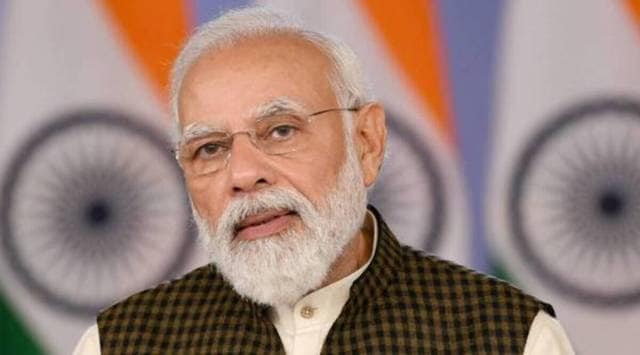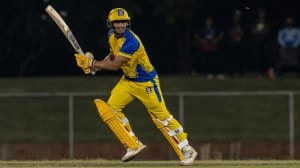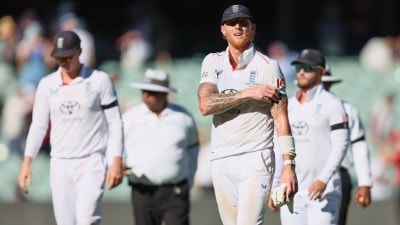WHILE UNDERLINING the need to focus on local containment measures to check the spread of the highly transmissible Omicron variant, Prime Minister Narendra Modi on Thursday asked state governments to ensure “minimal loss to the common man’s livelihood and related economic activity”.

India reported 2.47 lakh new infections on Thursday, with the active case count touching 11.17 lakh. The daily case count in Delhi and Chennai crossed their respective second wave peaks on Thursday. Delhi reported 28,867 new cases; the previous peak was 28,395 on April 20 last year. Chennai reported 8,218 cases; the previous peak was 7,772 cases on May 12 last year.
Kolkata and Mumbai have also crossed their second wave peaks. Kolkata is currently reporting over 6,700 cases daily; it did not cross the 4,000-mark during the second wave. The case count in Mumbai climbed up to almost 21,000 this time, but has come down in the last few days. On Thursday, it reported 13,702 cases. During the second wave, Mumbai’s daily case count peaked at 11,206 on April 4 last year.
Among the major states, West Bengal is the only one to have crossed the second wave peak for now.
“Omicron variant is infecting more people compared to the previous variant. This is also spreading at a faster pace. In just one day, the US reported 14 lakh cases. In India, both our scientists and doctors are analysing the data and the situation. It is very clear that we have to be vigilant. We have to be careful. However, we also have to ensure that there is no panic situation,” Modi said.
“There cannot be any drop in the level of alertness, both by the administration and the people, during the festivity. The key to success, during this period, is to again adopt the pre-emptive, proactive and collective approach. The more we are able to contain the spread of infection, the less trouble we will be in,” Modi said.
Story continues below this ad
“We also have to keep in mind that we have two years of experience in fighting this pandemic. The country is also well-prepared. There should be minimal loss to the common man’s livelihood and related economic activity. The pace of economic progress should be maintained. We have to keep this in mind, whenever we are making a strategy (for Covid-19 containment),” he said.
Modi asked states to ramp up testing to break the chain of transmission. “This is very important. That is why it is better to focus on local containment. Whichever pockets are showing more cases, testing has to be ramped up. We have to ensure this,” he said.
Saying that the healthcare systems should not be overwhelmed, he asked the states to implement an effective home isolation strategy. “We have to ensure that maximum treatment should take place in home isolation… If we have effective tracking and treatment facilities in home isolation, the possibility of going to a hospital will reduce. When people get infected, they call the control room. So there needs to be swift response and continuous tracking…. many states are implementing innovative methods in this direction,” he said.
He highlighted that vaccination continues to be the most important tool in fighting the infection. “Majority of the experts are of the view that whatever the variant, the most potent weapon to fight Covid-19 continues to be the vaccine… We have given the first dose to 92% of the adults. Almost 70% have received two doses… In just 10 days, 3 crore adolescents have received first dose. This shows our strength and preparedness,” he said.
Story continues below this ad
“Today the states have good availability of vaccines. The faster we are able to administer the precautionary dose to frontline workers and senior citizens, we will strengthen our health systems correspondingly… For 100% coverage, we have to accelerate the pace of doorstep vaccination drive,” Modi said.
The Prime Minister asked the states to scale up medical infrastructure and manpower. “As far as availability of medicines is concerned, the Centre will continue to provide support. Many states have also strengthened their health infrastructure using the emergency health response fund. Through this, 800 paediatric care units have been established. Approximately, 1.5 lakh ICU, oxygen, and HDU (high dependency unit) beds are being established. More than 5,000 ambulances have been added…we have to keep enhancing the emergency infrastructure….even after Omicron, we should be prepared for a possible new variant,” Modi said.
The video conference was also attended by Union Home Minister Amit Shah and Union Health Minister Mansukh Mandaviya. The chief ministers of Karnataka, West Bengal, Tamil Nadu, Jharkhand, Uttar Pradesh, Punjab, Assam and Manipur spoke on the Covid-19 situation in their states.









